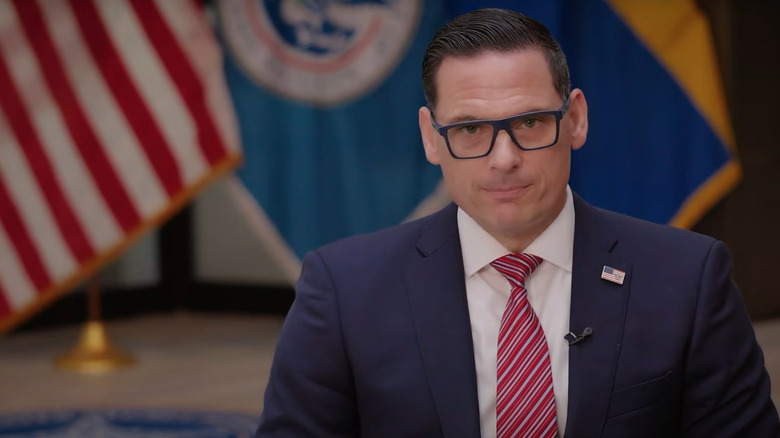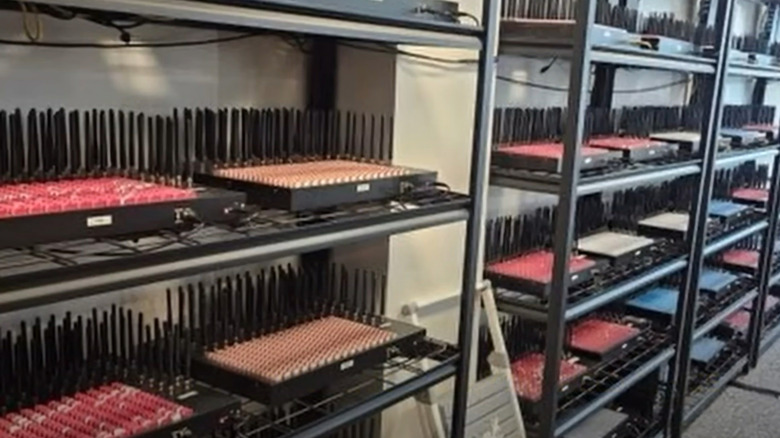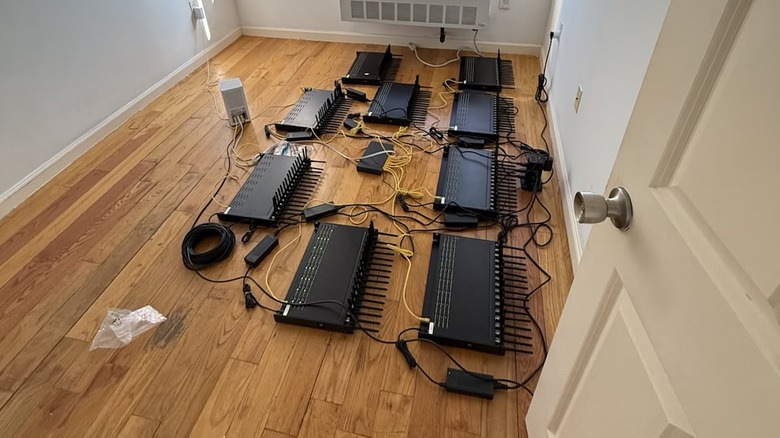This Scheme Could Have Shut Down NYC's Entire Cell Phone Network
On September 23, 2025, the Secret Service announced that it had dismantled a scheme that could have disrupted New York City's telecommunications systems, putting countless residents at risk. The busted network, known as a SIM farm, consisted of more than 300 servers hosting roughly 100,000 SIM cards at five locations across a 35-mile radius of the United Nations building in New York City.
In the statement, the head of the Secret Service's New York field office, Matt McCool, stated that the agency's investigation began following "multiple telecommunications-related threats directed towards senior U.S. government officials" in the Spring of 2025. In conducting its inquiry into the source of these fraudulent calls, the Secret Service elicited the support of local and federal agencies, including Homeland Security Investigations, DNI, DOJ, and local law enforcement.
According to McCool, the disrupted network "allowed anonymous, encrypted communications between potential threat actors and criminal enterprises, enabling criminal organizations to operate undetected." In addition to these calls, the Secret Service warned that such a network could have been used to attack the city's cellphone networks by overwhelming its towers with calls, utilizing their Voice Over Internet Protocol (VOIP) systems. Authorities have highlighted the dangers of such an attack in light of the U.N. General Assembly meeting this week. Although no arrests have been made to date, McCool listed a host of potential perpetrators in an interview with the Associated Press (via YouTube), including foreign nation-states and organized criminal groups, from drug cartels to terrorist groups.
What is a SIM farm and why is it dangerous?
While the Secret Service's announcement makes this seem like a once-in-a-lifetime event, SIM farms have become relatively common in the criminal underworld over the past few years. Often used to orchestrate mass phishing and phone call scams, SIM farms essentially use a vast number of SIM cards from different mobile operators to send and receive messages and calls in bulk. To do so, criminals exploit a network's VOIP protocols, which allow users to make phone calls over a broadband connection rather than phone lines. Over the years, these scams have become more sophisticated, capable of sending phishing emails and text messages while orchestrating mass phone calls with spoofed caller IDs.
Experts note that large SIM farms, like the one disrupted by the Secret Service, are capable of a more nefarious objective: Attacking telecommunication networks with millions of phone calls that shut down cell towers and cut off access to essential services like 911 or EMS calls. In McCool's description of the scheme (via YouTube), he notes, "It can't be understated what this network is capable of doing." According to reports, McCool stated that the scheme could have sent up to thirty million text messages a minute.
Anthony J. Ferrante, head of cybersecurity at global consulting firm FTI, noted in an interview with PBS that such networks could also be used to execute vast surveillance operations. Ferrante says a SIM farm of that scale "could be used to either intercept communications, eavesdrop on communications, or actually, clone devices, as well."
An ongoing investigation
Secret Service officials stressed the importance of shutting down such a system in the face of the United Nations' upcoming General Assembly, raising the specter of cellphone blackouts in the wake of the September 11 attacks and the 2013 Boston Marathon bombing as evidence of the chaos such overburdened telecommunication failures can wreak. However, officials have not gone as far as to say the plot explicitly targeted the U.N., with the only targets specified by law enforcement being the aforementioned unidentified government officials.
The next step in the Secret Service's investigation will be to conduct an in-depth forensic analysis of the SIM cards uncovered in the scheme. According to officials involved in the investigation (via NBC), "We're working through every call, every text, every search made on those SIM cards." Although the identity of the plan's masterminds remains unclear, the Secret Service stated that its preliminary analysis shows a nation-state acting in accordance with criminal organizations "known to federal law enforcement." Due to its scale, officials believe that the perpetrators were organized and well funded, noting that the scheme involved millions of dollars in hardware. As is common in the modern security climate, the scheme could have been orchestrated remotely across thousands of miles.
As the Secret Service continues its investigation, observers note that the scheme is indicative of a national security landscape in which local infrastructure, corporations, and private individuals are increasingly targeted by international threats. There are American businesses that have been targeted by laptop farms orchestrated by North Korean hackers to raise money for the country's missile program. As Ferrante noted in his interview, the scheme is "a stark reminder of how deeply interconnected our world has become, where local vulnerabilities can be exploited globally."


